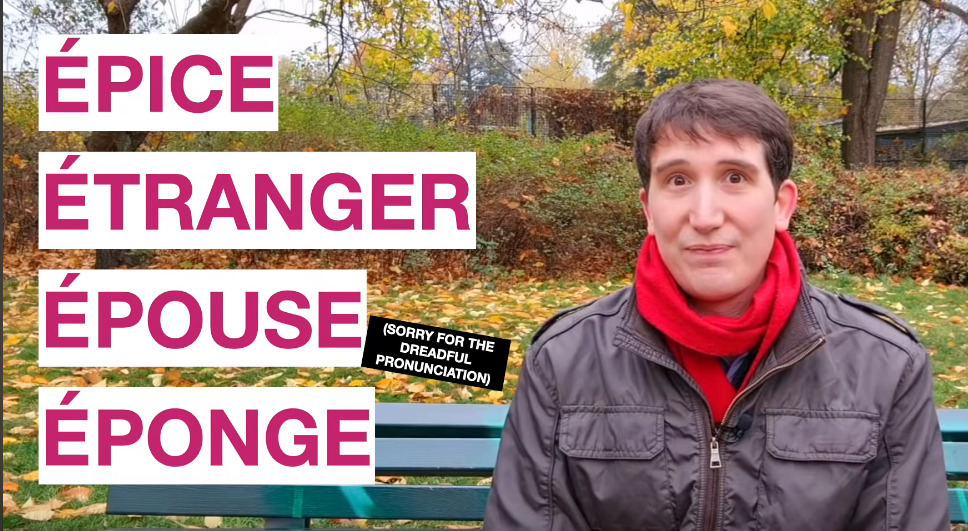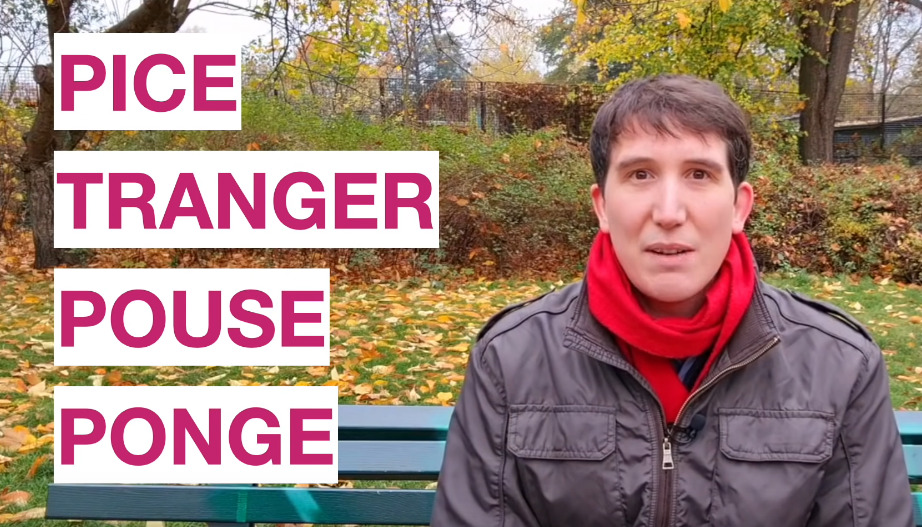How to Translate French Words
WITHOUT KNOWING FRENCH
3 Clever Tricks

Let me teach you how to read French words without already knowing any French.
The reasons why these tricks work raise some fascinating facts about the history of the English language.
👇 Watch and I'll explain. 👇https://youtu.be/3BGaA3PC9tQ
By inserting an extra S
here or there, some French words magically become much more like their
English equivalents (or "cognates"). Also, the clever deployment of a W can render even the most Gallic of words easily recognizable.



🇫🇷 DISCLAIMER The tricks don't work every time... but when they do, it is enormously satisfying.
There is one more trick also explained by the Norman language:
If a word starts with "ch" then try to drop the h letter after the c letter .
For example with "chat" you get cat, with "char" you get car, with "chaudron" you get caudron (cauldron) and with "château" you get "casteau" (castle).
Comments 🗣
I'm french and I think this video is lovely! By the way, the french word for "coast" is also "côte", when used about wines (like "Côte de Bourg" or others...) it refers to the side of the valley where the vineyard grows, so a "côte" is always next to water... So yes, it is absolutely related to "coast".
Comments 🗣
I'm french and I think this video is lovely! By the way, the french word for "coast" is also "côte", when used about wines (like "Côte de Bourg" or others...) it refers to the side of the valley where the vineyard grows, so a "côte" is always next to water... So yes, it is absolutely related to "coast".
🗣
Char is a french word. One meaning is an ancient horse-drawn two-wheeled vehicle. The other meaning (more common) is tank (armored military vehicle). Both words char and tank can be used. Actually "char" in french Canadian means car which is very different from the European french word "voiture".
Char is a french word. One meaning is an ancient horse-drawn two-wheeled vehicle. The other meaning (more common) is tank (armored military vehicle). Both words char and tank can be used. Actually "char" in french Canadian means car which is very different from the European french word "voiture".
🗣
Just
a detail but castle actually came from old French castel. So here the English version is closer to old french than french is.😊
In old French « Château » was « Castel » and then castle in English.
🗣
As a french person that had a tough time learning English, this is so cool!! Should definitely be taught in school.
J'ai toujours pensé que l'étymologie était très importante mais malheureusement rarement enseignée à l'école
🗣
Just a little detail, the actual french is not exactly based on the dialect from Paris, but the one that was spoken in Touraine (south of Paris, in the Loire’s valley)
It was a bit different from the Parisian, especially for the intonation.
The video is also very fun for french speaker, good job !
In old French « Château » was « Castel » and then castle in English.
🗣
As a french person that had a tough time learning English, this is so cool!! Should definitely be taught in school.
J'ai toujours pensé que l'étymologie était très importante mais malheureusement rarement enseignée à l'école
🗣
Just a little detail, the actual french is not exactly based on the dialect from Paris, but the one that was spoken in Touraine (south of Paris, in the Loire’s valley)
It was a bit different from the Parisian, especially for the intonation.
The video is also very fun for french speaker, good job !
🗣
All English words who end with : TION are the same in French but a different pronunciation (une prononciation différente) révolution affirmation, animation, allocation etc... it won't teach how to speak French but it can be really useful
🗣
One of my favorites is ÉCHAFAUDAGE
É goes to S
CH goes to C
The U needs the L change
And finally AGE words are ING words
Vowels are the glue that can change to other vowels
So we can see the English word magically appear as SCAFFOLDING
🗣
Oh and also thank you for using the word "Trick". I am so fed up with everyone saying "Hack"
* You can translate "trick" by "truc" !
* The better word is technique. Tricks are for magicians and circus animals
* And the funniest is that technique is the exact same word in french, a technique, une technique !
🗣
There are a couple of rules that I remember about learning French. First, only the consonants in the word "careful" are ever pronounced at the end of a French word. And because French wants to sound beautiful to the ear, it attempts to have most words to begin with a consonant and end with a vowel. That is why the first rule is true.
Then with those words that start with a vowel, they are allowed to "steal" the consonant from the word previous to it in the phrase or sentence. And that is all that I recall when taking a short self French course on my long-playing 33-and-a third records. 🙂
É goes to S
CH goes to C
The U needs the L change
And finally AGE words are ING words
Vowels are the glue that can change to other vowels
So we can see the English word magically appear as SCAFFOLDING
🗣
Oh and also thank you for using the word "Trick". I am so fed up with everyone saying "Hack"
* You can translate "trick" by "truc" !
* The better word is technique. Tricks are for magicians and circus animals
* And the funniest is that technique is the exact same word in french, a technique, une technique !
🗣
There are a couple of rules that I remember about learning French. First, only the consonants in the word "careful" are ever pronounced at the end of a French word. And because French wants to sound beautiful to the ear, it attempts to have most words to begin with a consonant and end with a vowel. That is why the first rule is true.
Then with those words that start with a vowel, they are allowed to "steal" the consonant from the word previous to it in the phrase or sentence. And that is all that I recall when taking a short self French course on my long-playing 33-and-a third records. 🙂
🇫🇷 CONTENTS
00:00 Intro
00:59 Trick 1: Swapping É for S
03:50 Why Trick 1 works
04:58 Trick2: Letters with hats
07:43 Why Trick 2 works
08:17 Trick 3: Swapping GU for W
08:57 Why Trick 3 works
10:53 Translating a sentence
11:52 Goodbye
00:59 Trick 1: Swapping É for S
03:50 Why Trick 1 works
04:58 Trick2: Letters with hats
07:43 Why Trick 2 works
08:17 Trick 3: Swapping GU for W
08:57 Why Trick 3 works
10:53 Translating a sentence
11:52 Goodbye
🇫🇷
Check me out on Twitter & TikTok:


🇫🇷 🔠 🔤 🇫🇷 🔠 🔤 🇫🇷🔠 🔤 🇫🇷

No comments:
Post a Comment